Editor’s note: Quick reminder that I’m taking a break next week—the news roundup will be back Tue 18. In the meantime, be good, be sane, take a breath, and one step at a time 😉
In short:
- The Mississippi River is too dry to ship harvest and other commodities through it.
- Nearly half of Canadians are on the brink of insolvency.
- La Niña caused the wettest year in Sydney since records began in 1858.
Reminder: Join us for our monthly live chat on Discord tonight, Friday 07 @ 9 pm ET in the #prepper-chat-night channel!
Economy, energy, supply chain
Survey: Nearly half of Canadians are on the brink of insolvency. 46% of responders find themselves closer to insolvency. And 45% say it’s becoming more difficult to pay for transportation, 45% to pay for household necessities, 37% for housing, and 49% cannot put aside money for savings.
Low water levels in the Mississippi River halted shipments of grain, fertilizer, and other commodities. The supply chain snarl comes as the harvesting of corn and soybeans is ramping up. The US Army Corps of Engineers is dredging the river to deepen the shipping channel. But shippers fear that without substantial rain, the jam will persist well into the busiest grain export period of the year.
42% of the Oct-Dec 2021 U.S. exports of #soybeans to #China left from the Gulf, a flow that is now jeopardized due to low river levels. Chinese soymeal prices recently hit record highs due to lower soy imports this year. U.S. transport issues will not be helpful. pic.twitter.com/Rz8cmKQMLM
— Karen Braun (@kannbwx) October 5, 2022
Here's a look at how Sept 2022 rainfall measured up at several long-running stations. Driest in 150 years for Minneapolis, with many top 10s across the region. #MidwestClimate #drought pic.twitter.com/2BW7vVoj0C
— MRCC (@MidwestClimate) October 5, 2022
A new and devastating strain of bird flu is spreading to Southern California and could soon reach Central and South America. This year’s avian flu epidemic is spreading widely among wild birds, which has far-reaching implications for wildlife and human health. Wildlife experts say they are seeing a wave of dying birds moving south as the fall migration sets in. The risk to the general population is low for now, but hunters, farm workers, and other bird handlers should take extra precautions this year.
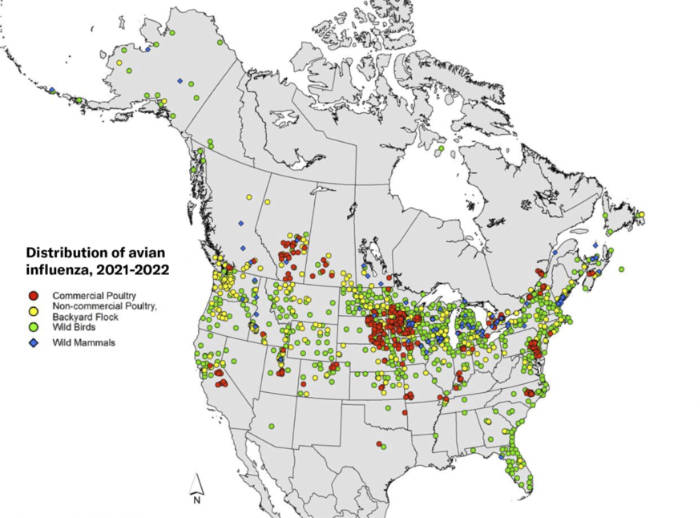
OPEC+ decided to cut oil production. As we said in the previous roundup, many OPEC countries were already unable to produce their quota, so some of these cuts might not be far from reflecting current realities. But bent crude prices have already risen, and it’s possible the US gas prices could rise by $15-30c/gal on average.
We’ve all heard of shrinkflation, but have you heard of ‘skimpflation’? Some companies are reformulating their products using cheaper ingredients to reduce manufacturing costs. But the change typically isn’t communicated to consumers, who may be unaware of the ingredient change yet are charged the same price.
An easy way to prepare for supply chain disruptions is to “use what you store, store what you use.” Every time you shop for your groceries, buy one extra of something you use regularly. This way, you’ll build up your own prepping pantry stash in a sustainable way. More:
- First In First Out: How the “use what you store, store what you use” model makes prepping easy
- Food list: How to build your survival pantry with long-lasting food from the supermarket
- Recipes for cooking with only non-perishable food
- The LDS food plan can help you build a pantry in less than 12 months
Climate change, environment, extreme weather
La Niña caused the wettest year in Sydney since records began in 1858. The total rainfall topped 2,213mm (87 in), surpassing the previous record set in 1950. The state government has committed to raising the height of the wall at Warragamba Dam, which supplies 80% of the city’s water, to help prevent future floods. Unfortunately, wetter springs and summers mean more mosquitos that carry the Japanese encephalitis virus.
Lack of rain dried up the Neekas river in British Columbia. Over 65,000 salmon are dead, and more than 70% failed to spawn. Several western coastal regions of British Columbia are experiencing drought level 4, which will likely impact socioeconomics and ecosystems:
This is Neekas, Heiltsuk Territory. All of these salmon went into the creek, the creek dried up b/c of no rain so far this fall, and just died, and this is just one reach! Global warming is killing everything. This is such a sad scene. Video credit, Sarah Mund pic.twitter.com/vYhEKwD5mN
— William Housty (@WilliamHousty) October 4, 2022
Oregon will cover health-related climate expenses, such as buying air conditioners, air filters, and generators. Beginning in 2024, Oregon residents who are enrolled in Medicaid, have a qualifying health condition, and live in areas where a climate-related emergency has been declared will be able to take advantage of the program.
Health
A new Covid wave is hitting Europe. As the US has followed European trends, a wave in the US is likely:
Western Europe sees strong growth in admissions, possibly beyond what it saw in June
Part of this growth may well come from in-hospital infections (cf 🏴) but the data for 🇧🇪 is "for covid" and its growth is also around 40% per week at the moment … pic.twitter.com/tPASmUKVW2
— Jean Fisch (@Jean__Fisch) September 30, 2022
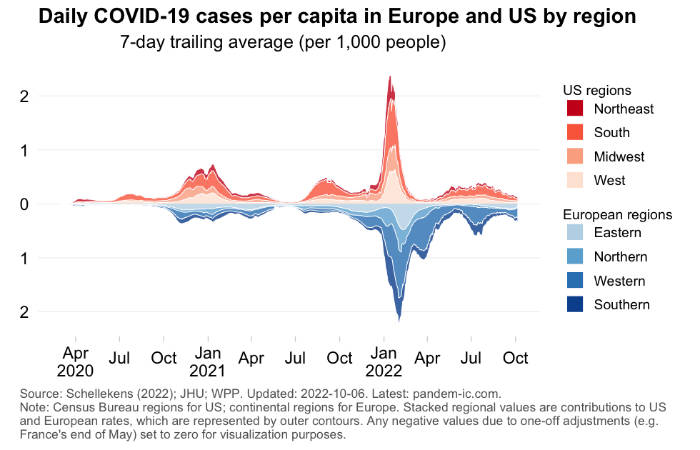
Experts warn that Covid now manifests in two-thirds of people with a sore throat. Fever and loss of smell are rare, and most people mistake it for a common cold. This wave is affecting older people slightly earlier than the last wave.
Q: Can you test positive after a Covid (booster)? A: No, because the tests are “testing for something not in the vaccine.” If you test positive after a shot/booster, it’s likely that you got infected prior to getting the shot. Read other Q&As here.
Health officials are warning that a severe flu season is coming and are urging vaccinations, especially for seniors. Australia, which experiences winter ahead of the US, just had its worst flu season in five years.
The CDC issued a travel alert for Uganda due to an Ebola outbreak. The US will redirect flights from Uganda to five airports for Ebola screening.
CDC issues Health Alert Network (HAN) Advisory about recently confirmed Ebola outbreak in Uganda to summarize CDC recommendations for U.S. health officials. No suspected, probable, or confirmed cases related to outbreak have yet been reported in the U.S. https://t.co/Qzjv3lfFGy
— CDC (@CDCgov) October 6, 2022
The rest
Engineers created a safe micro-nuclear reactor that fits in the back of a truck.The molten salt reactor stores radioactive elements in molten salt instead of fuel rods. Radiated heat is absorbed by the salt, so there’s no risk of a nuclear meltdown. The products of the reaction are safe inside the salt, so there’s no need to store them elsewhere. Due to the low risk of meltdown, the reactor is only 4 ft by 7 ft, and it can power 1,000 homes with it. The reactor fits on a 40-ft truck bed, so it can be taken almost anywhere.
Free life jackets loaned to anyone in need are saving lives in 1,000 locations across the US. The Sea Tow Foundation provides free life jackets to boaters of any size. The program now operates loaner stations in all 50 states, Washington, D.C., American Samoa, and the Virgin Islands. Since 2008, they’ve distributed over 90,000 life jackets. Click below for the interactive map:
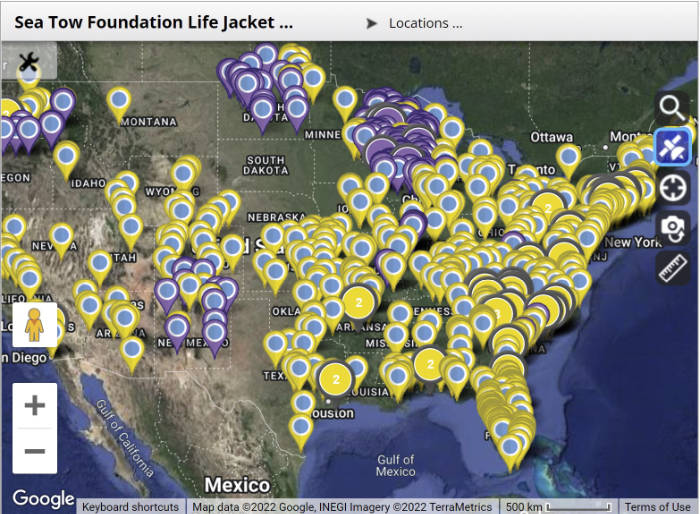
Giant supertanker uses 9.8% less fuel thanks to 130-foot sails. Ok, this does not have a direct impact on preparedness, but it’s cool to see how ancient, zero-emission sailing techniques are being revived and modernized, and they work!
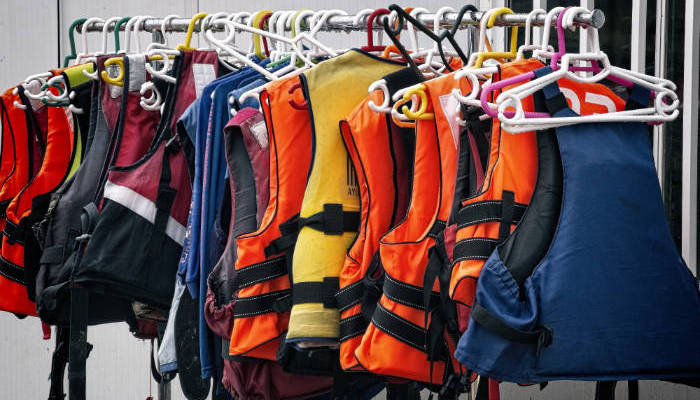
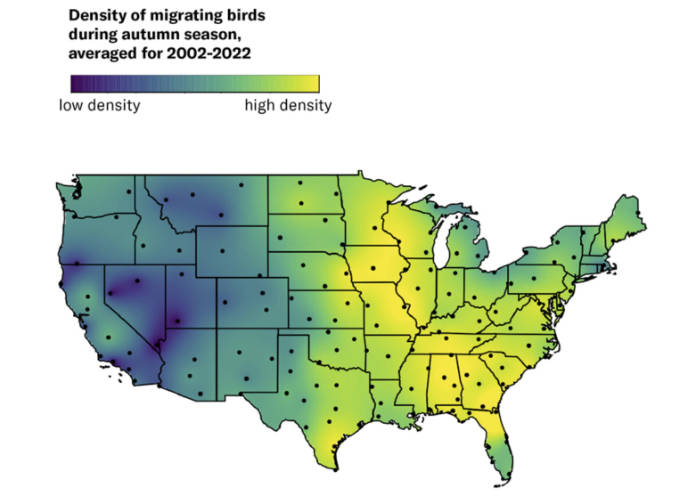
You are reporting the comment """ by on